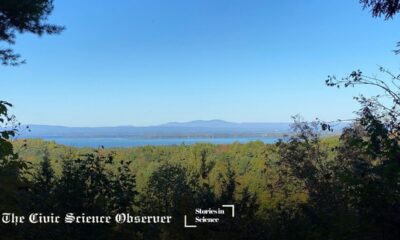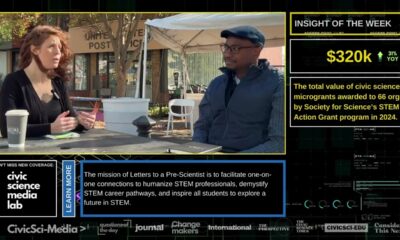Stories in Science Special Series
Stride On

– Kwasi Agbleke, Ph.D. –
[dropcap]M[/dropcap]y journey through two decades has been that of mission, vision, and determination. As a young boy, I always had difficulty answering the question: “What do you want to be when you grow up?” For many of my colleagues, it was either a doctor, teacher, lawyer or simply a professional. Coming from rural Ghana, it was laudable to dream of a job that would provide not just for myself, but my extended family as well.
This seemingly simple question embodied my dreams and aspirations. It defined my route. In my young head, I wanted my job to be something that wasn’t merely a profession, but rather a state of being. I wanted to be a learned fellow. I thought I would go to university to study biology, then law, sociology, philosophy…. on and on. I wanted to build my personal library and laboratory to test my hypotheses. These were a child’s dreams, which are yet to be accomplished.
In 1997, the most important decision in my life arrived. I was faced with selecting which course to pursue in senior high school. I was in a fix. The answer came from my family. Everyone thought I was smart enough to do science, but there was no consensus on it given its difficulty. The alternative was the humanities, which was “presumed” to be less difficult. I chose science for the challenge and more importantly to equip myself with tools to answer questions systematically. I got to senior high school with a sense of determination and goal to reach university. I met few alumni from Keta High School who made it to university. This gave me confidence that I could do it as well. I found myself naturally excited about every topic and subject. I was very determined. I excelled in all the examinations I participated in for the West African Examination Council.
However, on arrival to the University of Ghana, reality hit me. Unlike high school where we studied the core subjects in the sciences such as chemistry, biology and physics in addition to elective mathematics, things were rather different at the university. Within one field of study, there were many specialized areas. I took up biological sciences and made the cut for medical school. However, at this point I was sure I didn’t want to be a clinician. So I chose not to go to medical school. I found it mundane. Instead, I chose biochemistry. Why? Well, I found the field of biochemistry intriguing and it was here that my passion for genetics soared. The worrisome part of this decision was that the job market for biochemists was quite narrow in Ghana, but I was not willing to do something that I found unadventurous.
I had a good time with my biochemistry classes. At the same time, however, a young geneticist was being born unknowingly. The daily tasks within the field of genetics such as extracting viral and bacterial DNA for instance seemed like herculean tasks whilst the textbooks made it seem easy. Working and testing hypotheses with experiments was quite thrilling. I was determined to see the world through science and the failed experiments only motivated me to work harder. I graduated with first class honors in 2006 and got a one-year contract as a Teaching Assistant in the Department of Pharmacology at the University of Ghana Medical School.
The following year, I started my doctorate degree in Cellular and Molecular Biology program at the University of Alabama at Birmingham. I joined the laboratory of Dr. Patrick Higgins in the Department of Biochemistry and Molecular Genetics where I studied the genetic basis of chromosomal processes such as DNA supercoiling, replication, transcription and their interactions with nucleoid-associated proteins in E. coli and Salmonella. After five years of research, I co-authored a paper where we discovered the coupling of transcription to DNA supercoiling for optimal growth in bacteria. I graduated and joined Dr. Nancy Kleckner’s group as a postdoctoral fellow in the Department of Molecular and Cellular Biology at Harvard University where I study the genetics of homologous chromosomes interactions in mammalian cells.
“When you climb a good tree, there are always people to push you up.” – Ghanaian proverb
Despite my commitment to science, I never cease to read and research in areas far beyond my area of expertise. For me science is the pursuit of knowledge. It is a process geared to a goal to make the world a better place by understanding it. It involves researching intensely on what has been done before, and formulating new or advancing existing hypotheses. Reading and writing primary research articles, reviews, grants and attending conferences and seminars are tools that allow us to test our hypotheses in a systematic way. I am happy to have made this journey in these two decades. However, this has not been a smooth journey, there have been bumps, difficult times, pivots and frustrations. But each stage has been a learning opportunity.
In brief, my dream of building my personal library and laboratory has evolved over the decades into a research institute. I believe we have the main resource in Ghana for this endeavor, which is human intellect and determination to work. What I intend to create is the infrastructure and opportunity for young researchers who will contribute to advancements in science and arts. Over the years, the institute has slowly taken shape. In 2009, I bought my first plot of land in Kpandai (Northern Ghana) and 2012 the second plot in Penyi (Southern Ghana) as the institute’s sites. In 2015, we completed a 6-room office complex for the institute and registered Sena Institute of Technology (www.sitghana.org) in Ghana. This complex houses a library, art exhibition center, and a laboratory. Recently, we shipped infrastructural resources for the institute’s laboratory, library and office to Ghana.
My brother and co-founder, Michael Agbleke, and I have invested heavily to make this dream a reality. A dream is a figment of our imagination and it takes effort and determination to transform it into shapes and give it velocity. The future is bright and so long as the passion burns, I believe we will get there. Science has been a journey and I continue to stride on. I dream once again that in my lifetime Africans will eventually go beyond basic needs and stand TALL using science and technology.
I thank the many people who have made this a worthwhile journey.
Kwasi Agbleke, Ph.D. is a Postdoctoral Fellow at Harvard University and is the President and Co-founder of Sena Institute of Technology.
Cover image is by David Mark from Pixabay | CC0 Creative Commons
The CS Media Lab is a Boston-anchored civic science news collective with local, national and global coverage on TV, digital print, and radio through CivicSciTV, CivicSciTimes, and CivicSciRadio. Programs include Questions of the Day, Changemakers, QuickTake, Consider This Next, Stories in Science, Sai Resident Collective and more.

-
 Audio Studio1 month ago
Audio Studio1 month ago“Reading it opened up a whole new world.” Kim Steele on building her company ‘Documentaries Don’t Work’
-
Civic Science Observer1 week ago
‘Science policy’ Google searches spiked in 2025. What does that mean?
-
Civic Science Observer1 month ago
Our developing civic science photojournalism experiment: Photos from 2025
-
Civic Science Observer1 month ago
Together again: Day 1 of the 2025 ASTC conference in black and white
Contact
Menu
Designed with WordPress
























